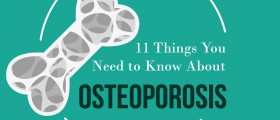
Gynecomastia is a condition characterized by enlargement of the gland tissue of the breasts in males. Gynecomastia may occur in one or both breasts. This abnormal breast enlargement develops due to imbalance of hormones estrogen and testosterone. It may occur due to normal changes in hormonal levels in infants, boys during puberty and elderly men. However, this condition may have other causes too and indicate certain serious medical issues. Gynecomastia is a benign condition that often resolves on its own. But, if breast enlargement persists it can be treated with medications or surgery.
Symptoms of GynecomastiaThe most obvious sign of gynecomastia is enlargement of breasts in men. Gynecomastia generally does not cause pain but it is accompanied by breast tenderness and sensitivity. Gynecomastia can affect one or both breasts and it can be uneven in same cases. Nipple discharge may or may not be present.
Causes of Gynecomastia
Gynecomastia may have different causes. It may occur due to fall in testosterone levels compared with estrogen. This hormone imbalance can be caused by conditions that interfere with levels of estrogen or testosterone. Balance of testosterone and estrogen can be affected by natural hormone changes that occur during puberty. Gynecomastia in pubertal boys may persist for six months to two years.
Gynecomastia can be seen in infants too due to the effects of mother’s estrogen. This generally disappears on its own within two to three weeks after birth.
Gynecomastia may also occur in older men as a part of aging, especially when there is associated weight gain. This most frequently affects men aged between 50 and 80. The condition is detected in at least one in four men during this period.
Gynecomastia can occur as a side effect of different medications. Antiandrogens such as flutamide, finasteride and spironolactone used for treatment of prostate enlargement, cancer and some other conditions can lead to gynecomastia. Diazepam, tricyclic antidepressants, antibiotics, anabolic steroids and androgens can also cause gynecomastia. The condition may occur in HIV positive men treated with highly active antiretroviral therapy. Other drugs that can cause gynecomastia include ulcer medications, heart medications, calcium channel blockers, ACE inhibitors and drugs like marijuana, heroin, methadone, amphetamines and alcohol.
Underlying medical conditions can also cause gynecomastia. They include hypogonadism, tumors of the adrenal glands, testes and pituitary gland, hyperthyroidism, kidney failure, liver failure and liver cirrhosis.
Malnutrition and starvation can lead to hormonal imbalance and also result in gynecomastia.

















Your thoughts on this
Loading...